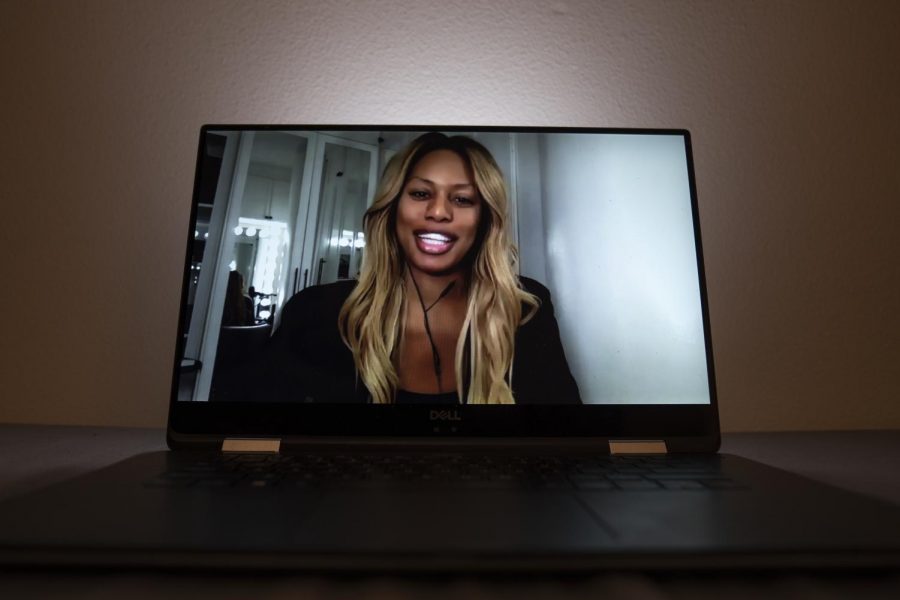Laverne Cox shares life experiences, advice with virtual audience
Laverne Cox, Orange is the New Black star and trans activist, discussed her experiences living as a trans woman in America, talked about her documentary film Disclosure, and gave lasting advice to her audience.
Emmy-nominated actress, documentary film producer and equal rights activist, Laverne Cox, holds her “Ain’t I A Woman: My Journey to Womanhood” lecture to UI students virtually at 7:00 PM on Wednesday, Oct. 28, 2020. She speaks of her time growing up in Mobile, Alabama and struggling with her gender identity. (Matthew Hsieh/The Daily Iowan)
October 29, 2020
Emmy-nominated actress, film producer, and prominent equal-rights advocate Laverne Cox delivered a powerful message in a Wednesday night lecture sponsored by the University of Iowa’s Lecture Committee.
Cox broke many barriers when she became the first trans woman of color to perform a leading role in a mainstream television program. She played prisoner Sophia Bursett in Orange is the New Black. The actress paved the way for trans women of color through her activism before her breakout role, and continues to utilize her platform to empower.
University Lecture Committee members Anna Correa, Amna Haider, and Aastha Chanda helped plan the event and served as hosts. There was also a student panel composed of students Ever Taylor, Savannah DeGroot, and Adeline Barron.
“This event could not have happened without the hard work from staff and students, particularly Black individuals who advocated to bring more Black trans women and non-binary individuals to campus,” Correa said.
Cox and the panelists met on their Zoom screens with smiles and excitement. Cox spoke about her childhood upbringing, her documentary Disclosure – which premiered on Netflix in June – and her activism within the transgender community.
Cox said her childhood molded her into the individual she is today. Raised by a single mother in Mobile, Alabama, with her twin brother, Cox begged her mother at age 5 to be put into dance classes.
From then on, she said, performing became her salvation. In high school, she attended the Alabama School of Fine Arts which was located in an affluent white community four hours away from her hometown. Adjusting to this environment was a struggle for her, as she was constantly ridiculed by other peers.
“My goal was to get out of Alabama,” Cox said. “In high school, I was called many terrible racial slurs that to this day still ache. So, I moved out to New York, and 20 years later Orange is the New Black premiered.”
RELATED: University of Iowa Lecture Committee hosts ‘1619 Project’ creator Nikole Hannah-Jones
Cox said she always had an interest in LGBTQ and trans history because she rarely saw it represented in film.
Disclosure, directed by Sam Feder, debuted on Netflix in June 2020. Disclosure was inspired by the 1995 documentary film The Celluloid Closet. Disclosure featured Cox and an entirely trans cast and crew. While talking about Disclosure, Cox smiled and noted how she could talk about it for hours on end.
“Disclosure feels like the culmination of all the work I have done, it is starting to change the narrative of how we view trans on film,” Cox said. “Understanding our history is the starting point, the blueprint for reform and comprehension.”
The second half of the lecture included hosts reading questions sent in by the viewers of the lecture. Cox answered each question, which included what advice she would give to her younger self, her guilty pleasures, how she takes care of her mental health, and how to deal with transphobic environments.
Student panelist Ever Taylor posed various questions to Cox, including when the actress realized that she was becoming one of the most prominent faces of the trans movement. Then, Taylor talked about her own experiences as a queer woman.
“It brings me joy to hear you talk about your work, and I have always had joy watching you work,” Taylor said after Cox answered her question.
Many view Cox as one of the most prominent trans-movement leaders. She credits this to her role within Orange is the New Black, that strengthened her platform. Before the show, she was an activist writing for the Huffington Post and attending rallies and protests.
“Nothing prepares you for the responsibility of being the face of a movement and the community,” Cox said. “The conversation needed to be changed, the media was a mess, and we had to work for it. I just do as much as I can.”
The lecture was supported by many UI organizations, including University Student Government, Pride Alliance Center, Office of Multicultural & International Student Support and Engagement, and the Afro-American Cultural Center.
“Whether this event was your first introduction to the trans rights movement or you’re a member of the transgender community, I think everyone had something to learn from Laverne,” Correa said.
“Transitioning is a discovery, it never stops,” Cox ended with a keynote. “It is not always easy, but there are always resources and people alongside your journey.”



